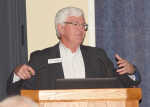Leadership key to rural future

McCOOK, Neb. -- The list of issues facing rural Nebraska communities seems insurmountable. Chuck Schroeder's list grew with each screen shot he flashed on the wall during his presentation at the Southwest Nebraska Rural Symposium at McCook Community College Wednesday.
It's not just jobs and housing hurdles that get the most headlines. The list ranges from healthcare to immigration to quality of life.
But Schroeder, a Palisade native and the founding director of the Nebraska Rural Futures Institute, has faith that rural Nebraskans have the leadership, and can develop the leadership in their young people, to address each challenge.
"In communities doing more than 'just surviving, it comes down to leadership," Schroeder said. That is especially true in McCook, he said, a community known for its history of state and national leaders.
Schroeder believes, as does University of Nebraska leadership, that "Rural matters." Cynics told him that the new "Nebraska Rural Futures Institute" would never work, that "the future of Nebraska is Lincoln and Omaha, and maybe Grand Island." But, he said, they have discovered a powerful support for the vision and approach of the Rural Futures Institute (RFI) -- to "increase community capacity as well as the confidence of rural people" to address their challenges and opportunities.
The RFI is not "just an academic study," Schroeder said. "It's an on-the-ground, real-world approach to addressing the challenges of rural Nebraska," which include:
The first screen shot, in bold letters: Job creation (entrepreneurship, small business development). "Jobs are critical to the success of any community," Schroeder said.
The next screen shot adds leadership, youth engagement, education, healthcare, natural resource conservation/sustainability, workforce availability. Young people are looking for communities they can "belong" to, that they can invest themselves in, where they can "make a difference," Schroeder said.
Next screen: Transportation, telecommunication.
The next screen adds immigration.
The final screen: Housing, community infrastructure, law enforcement and quality of life.
Schroeder wanted his listeners to understand that the RFI is "in the discovery business," that "it's all about new ideas."
In its first two years, RFI has initiated 31 projects focusing on economic development, leadership and civic engagement, healthcare, community planning and marketing, and the justice system, partnering with universities and colleges, organizations, companies and 113 communities.
Projects initiated by RFI in 2015 include teaching/engagement and research/engagement grant awards for career development in rural communities, leadership in diverse communities, assessing community quality of life factors in minorities and a family-based pediatric obesity treatment program.
* "Connecting Young Nebraskans" involves 550+ young professionals who are connecting, thinking and working together through modern leadership engagement strategies.
* The "Pilger Project" took UNL architecture students to Pilger, to help the community rethink its town after the tornado in June 2014 destroyed most of it.
* The "Rural Community Serviceship Program" involved students in a three-week summer course and an eight-week summer internship to live, work, and play in their assigned community.
To learn more about the Nebraska Rural Futures Institute, go to: ruralfutures.nebraska.edu
The 2015 fall Rural Futures conference, "Hope Inspires Vision," will bring together local, state, national and international stakeholders who are committed to creating brighter futures for rural America.
The conference is scheduled on the Nebraska Innovation Campus in Lincoln Oct. 21-23; and at the Nebraska College of Technical Agriculture in Curtis Oct. 21-22.
In conjunction with the conference, organizers plan the "Rural Opportunities Fair" Oct. 21 on the University of Nebraska's East Campus in Lincoln. This is a pilot event for the RFI and more than a career fair. Community representatives will engage with students interested in establishing their futures in a rural place and talk about internship and career opportunities.
